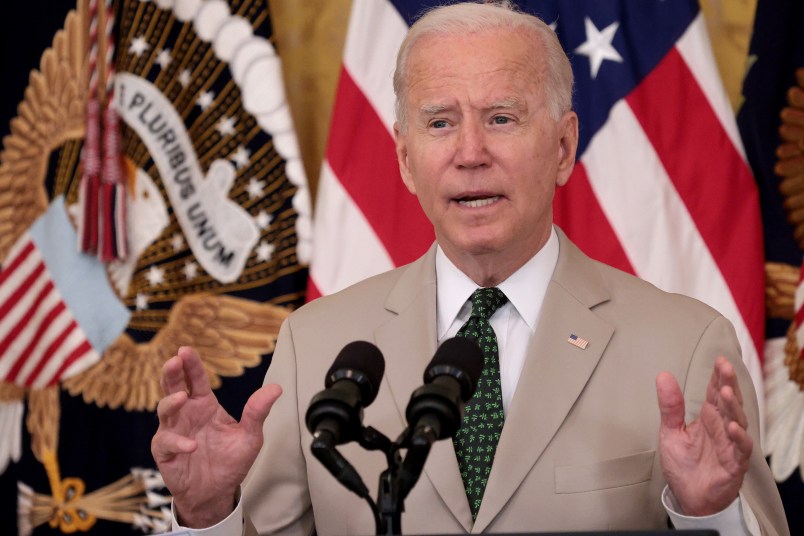The Biden administration announced Friday afternoon that it is extending the student loan repayment pause through January 2022.
The extension, which the administration said would be the final one, pauses loan repayment, interest and collections until February of next year.
Some key Democrats, including Senate Majority Leader Chuck Schumer (D-NY), applauded the move but said it falls short of what’s needed.
“While this temporary relief is welcome, it doesn’t go far enough,” Schumer, Sen. Elizabeth Warren (D-MA) and Rep. Ayanna Pressley (D-MA) said in a joint statement. “We continue to call on the administration to use its existing executive authority to cancel $50,000 of student debt. Student debt cancellation is one of the most significant actions that President Biden can take right now to build a more just economy and address racial inequity.”
Advocates for debt cancellation have long said that President Joe Biden could eliminate up to $50,000 with just an executive order.
Biden said at a February town hall that he doesn’t think he has the authority to do it. He also expressed concern that most of the benefit would go to students who attended elite private schools.
“It depends on the idea that I say to a community, ‘I’m going to forgive the debt, the billions of dollars of debt, for people who have gone to Harvard and Yale and Penn,’” he said.
House Speaker Nancy Pelosi (D-CA) echoed his argument that he doesn’t have the power to do it unilaterally last week.
“People think that the President of the United States has the power for debt forgiveness,” she said. “He does not. He can postpone, he can delay, but he does not have that power.”
There is some legal uncertainty around the question. The Higher Education Act grants education secretaries the power to “enforce, pay, compromise, waive, or release” government-held student loans, which is how Education Secretary Miguel Cardona
can institute the pause in the first place. It’s not clear how that applies to mass cancellation, though some experts think it passes legal muster. Such a move on Biden’s part would be likely be followed by litigation.
The President called for his administration to do a thorough investigation of whether or not he has the authority in April.
As of early July, the Biden administration had erased about $1.5 billion in student debt, some of it by forgiving the loans of student borrowers who were defrauded by schools.







Well, maybe some. But economics have changed a lot over the last 40-50 years, and not for the better. In the case of my son, class of 2017, we stuck with state schools, in-state tuition, nothing fancy, just a great SUNY school with a good engineering department. At the end of 4 years, in 2017, my kid owed $25,000.00 and I owed $50,000.00.
When I put myself though school in the Before Time, I did it at a state school in New England, with Pell Grants, a small bank loan, and playing in bands at night, living in my own apartment, no roommates. When I graduated in 1986 I owed about $1500.00. Even allowing for inflation that’s only about $3700.00 in 2021 dollars.
An undergraduate degree is now the new high school diploma, it’s required more than ever, and the price of even basic entry has gone up radically. Basically, if you want a college education it’s gonna cost ya, few if any easy ways out.
So is the $10,000 forgiveness now off the table?
It seems like that would help the largest number of student loan holders not moving into high salary jobs.
I wonder how easy it is for students to get summer jobs. I know that in Canada it isn’t as easy as it used to be. Business used get financial incentives from government to hire students. In my own case I also worked part time during the school year. I paid for everything; tuition, housing, food etc. After 6 years of study I had no debts.
Here’s the clincher. I got union wages, without having to pay union dues or government taxes. In my last industrial job as a student (1978) I made $25 per hour. My part time job working for a French men’s fragrance company also paid that well, plus commission. Plus the models I worked with
per hour. My part time job working for a French men’s fragrance company also paid that well, plus commission. Plus the models I worked with  seriously.
seriously.
I was not the only one and would like to suggest that unions, government and the private sector start realizing that the future of America, Canada and other places depend on the youth. They need to be supported for the long haul. Completely wiping out their debt would solve many problems faced post education.
The answer is that the vast majority of those students not only have summer jobs, but year round jobs, called work study. They still graduate with debt because there is no job that a student can get that pays enough to cover tuition, room and board, fees, textbooks, supplies, etc.
People who haven’t attended or paid for college in the last 10-15 years still don’t realize how much more expensive even the “cheap” public universities have gotten.
With state governments continuing to cut education budgets (egged on by their Federal peers of the past few years and various libertarian factions), the state universities are having to make up the difference some place else, like tuition. Until/unless the governments start stepping up support again, there’s not much hope for improvement.
Alternately, enacting some version of Biden’s or Bernie’s vision of free/reduced-cost college would be a new way of doing things, but it’s unlikely with the current make-up of Congress and the other priorities that liberals/progressives are already juggling.